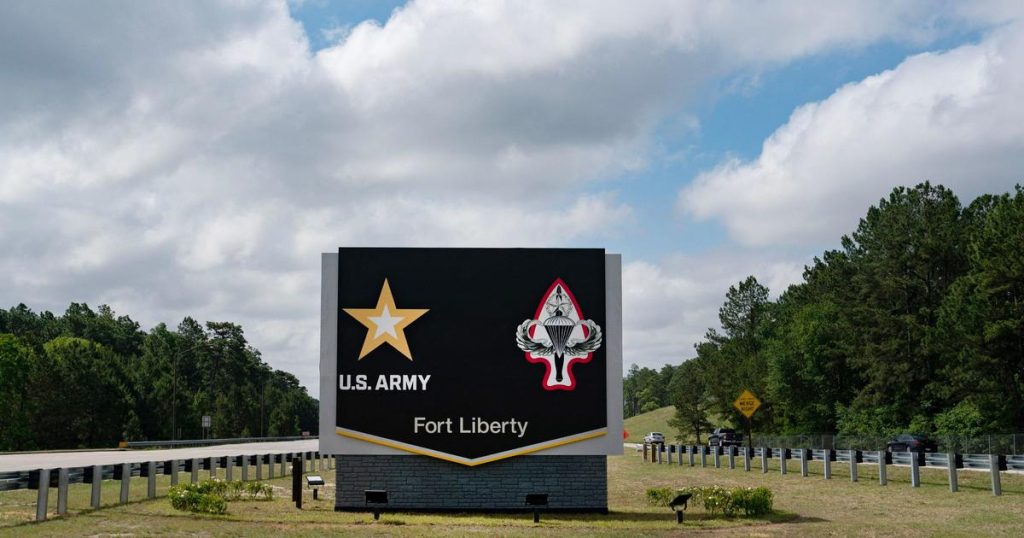The Pentagon Reverses Decision, Renames Fort Liberty Back to Fort Bragg
The Pentagon has announced a significant reversal in its decision to rename Fort Bragg, one of the most prominent military bases in the United States. The base,which was officially renamed Fort Liberty in June 2023, will now revert to its original name, Fort Bragg. However, the new designation will not honor the base’s original namesake, Confederate General Braxton Bragg, but instead pay tribute to Private First Class Roland L. Bragg, a World War II hero who was awarded the Silver Star for his bravery during the Battle of the Bulge. This decision, outlined in a memo signed by Defense Secretary Pete Hegseth, reflects a complex interplay of history, identity, and political influence. Pentagon Press Secretary John Ullyot emphasized that the change "reflects the installation’s proud history of honoring selfless service and sacrifice in defense of the nation."
A New Namesake with a Rich History
The decision to rename the base after Private First Class Roland L. Bragg marks a deliberate shift in how the military honors its heroes. Roland Bragg, who served with distinction in World War II, was initially considered as a potential namesake during the renaming process. However, the previous decision to name the base Fort Liberty was made to avoid associating the installation with any single individual, opting instead for a name that symbolized freedom and democracy. Now, by choosing Bragg, the Pentagon is balancing the desire to distance itself from Confederate symbols while still honoring the legacy of a soldier who exemplified courage and sacrifice.
This change is not merely a matter of semantics; it represents a broader debate over how the military grap-ples with its historical roots. The original Fort Bragg was named after General Braxton Bragg, a Confederate general who fought against the Union during the Civil War. The base’s renaming was part of a larger effort by the federal government to address the legacy of Confederate symbols on military installations. In 2020, Congress mandated the creation of a Naming Commission to identify and rename bases, ships, and other military assets that honored Confederate figures. Fort Bragg and Fort Benning were among the nine bases targeted for renaming, with Fort Bragg being officially renamed Fort Liberty last year.
Political and Emotional Undertones of the Decision
The renaming of Fort Bragg has been a politically charged issue, with significant backlash from certain quarters. Former President Donald Trump, during his 2024 campaign, criticized the decision to rename the base, calling it an attempt to erase American history. At a rally in Fayetteville, North Carolina, near the base, Trump vowed to restore the original name, stating, "We’re gonna get it back. We’re gonna bring our country back." His comments resonated with many veterans and local residents who viewed the name change as a disservice to the base’s rich military heritage.
Pete Hegseth, now the Secretary of Defense, has long been an advocate for reverting the base’s name. Before his appointment, Hegseth, a veteran himself, argued that the original name should never have been changed. "Legacy matters," he said during a book promotion. "My uncle served at Bragg. I served at Bragg. It breaks a generational link." Hegseth’s personal connection to the base underscores the emotional weight of the issue for many service members and their families. Upon entering the Pentagon, he even referred to the renamed bases by their original names, signaling his intent to revisit the decision.
The Strategic Importance of Fort Bragg
Fort Bragg, regardless of its name, remains one of the most critical military installations in the world. It is home to the Army’s Special Operations Command (SOCOM) and the 82nd Airborne Division, often referred to as the "tip of the spear" for its rapid deployment capabilities. The base has played a pivotal role in nearly every major U.S. military operation since World War II, earning a reputation as the epicenter of American military power. Its significance extends beyond its operational role; it is a symbol of U.S. strength and readiness.
The decision to revert to Fort Bragg has been met with mixed reactions. Supporters argue that the name change restores a sense of continuity and respect for the base’s storied history. Critics, however, view the reversal as a step backward, accusing the Pentagon of succumbing to political pressure rather than confronting the problematic legacy of Confederate symbols. The debate highlights the delicate balance between honoring the past and embracing a more inclusive future.
The Cost and Complexity of Renaming
The renaming process has also raised practical concerns, particularly regarding the financial and logistical burden. The Naming Commission initially estimated that changing the name of Fort Bragg to Fort Liberty would cost over $6 million. This figure includes expenses related to updating signage, documents, and other materials. Now, reversing the decision will likely incur additional costs, though the exact amount has not been disclosed. Defense Secretary Hegseth’s memo instructs the Army to provide a detailed timeline and budget for the implementation of the name change.
The case of Fort Bragg serves as a microcosm for larger debates about historical memory and national identity. While some view the reversal as a victory for tradition and heritage, others see it as a missed opportunity to confront the darker aspects of American history. As the Pentagon navigates this complex terrain, it must weigh the competing demands of honor, legacy, and progress. Ultimately, the decision to rename Fort Bragg reflects a society grappling with how to reconcile its past and present.












